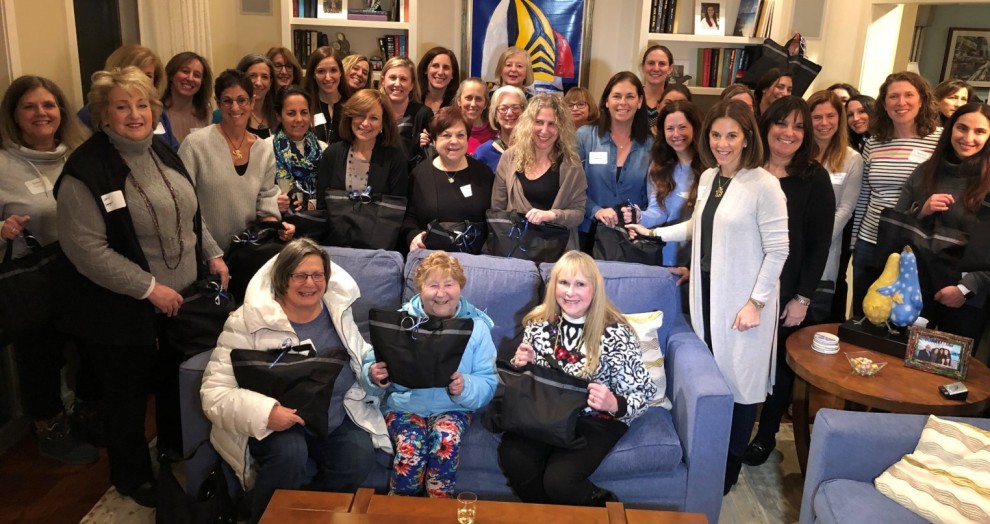
Through their philanthropy and their hands-on community service, Federation women have always been deeply involved in repairing the world. These days, women are more active than ever, rising to the challenges brought by the pandemic and working to improve lives in their own communities and around the world. They are leading emergency response campaigns, spearheading food drives and restocking pantries, and keeping communities connected.
And across the country there are women who are using their unique skills and talents to solve problems. Here are just two of them.
Jessica Zachs, Hartford: Bringing Dignity to Women and Girls
A little over a year ago, after watching the documentary Period. End of Sentence, Jessica Zachs was inspired to do some research about period poverty in America. She learned that 20 percent of American women can’t afford hygiene products, forcing them to miss school and work every month. “I realized that there’s this incredible need for hygiene in Hartford,” she said. Menstrual products are not covered by government nutrition programs like SNAP, and food pantries don’t typically carry them.
Jessica, a member of the National Women's Philanthropy Board, has always been very active in the Hartford, CT, Jewish community. So when she decided to act, she naturally turned to her Federation community.
“My friend and I put our heads together and planned a grassroots evening,” she said. Federation volunteers packed 200 zippered totes with pads, tampons, toothpaste, toothbrushes and soap, and gave them out at the local kosher food pantry and mikvah. The project grew quickly, and in the first year the group packed 3000 bags, found distribution partners, and started to professionalize, taking the name Dignity Grows and creating a brand.
The COVID pandemic only deepened the need. “It was incredibly frightening,” Jessica said. “Hourly wage earners were the first to lose their jobs. I know from our distribution partners that the need has grown.” And the group’s mission grew beyond the original audience of menstruating girls and women, now targeting older adults who use the food pantry. Dignity Grows volunteers are now packing totes for seniors, minus the feminine hygiene products. They recently held their first socially-distanced pack.
Through National Women’s Philanthropy, Jessica is spreading the world about Dignity Grows to Federations across the country. Six other communities have done small packs, and this fall the project will roll out as a national initiative, with a dedicated website and access to Jessica’s experience and advice. Thirty Federations have already expressed interest.
“This project helps anyone who has a need,” Jessica reflected. “It’s such a fulfilling thing to know, and it’s the highest form of tzedakah, helping people we will never meet, fulfilling a need we didn’t even know was there.”
Jennifer Failla, Austin: Search and Rescue Through a Jewish Lens
“It’s not your job to finish the work, but you have to engage in it.” This quote from the Ethics of the Fathers (Pirkei Avot) drives Jennifer Failla’s work, as a professional and as a leader at Shalom Austin, her Federation, where she is endowment chair for Women’s Philanthropy.
It’s probably safe to say that Jennifer is the only current (or past) member of the National Women’s Philanthropy Board who has served as a member of Texas Search and Rescue (TEXSAR). Trained in ground, flood and swiftwater rescue, Jennifer is the Dive Team lead as well as a K9 handler. She has been deployed many times, including during Hurricane Harvey. In Austin, she has assisted at COVID-19 testing centers throughout the pandemic.
Saving lives is Jennifer’s job, but a recent assignment truly felt like a tikkun olam moment for her. In May, she was deployed to help get food and supplies to Native Americans. On the borders of Arizona, New Mexico and Utah, the Navajo Nation has been hit especially hard by COVID-19 — the 27,000 square foot reservation now has the highest per capita infection rate in the country when compared with individual states.
Jennifer saw beyond the depth of the need on the reservation — she recognized parallels between the Native American communities she visited and her own Jewish community. “I didn’t know a lot about the Native American community and culture,” she said, “and I was awestruck at how similar they are to the Jewish community — supporting each other, there for each, based around community centers.” She talked to the people she met about their cultural similarities.
The connections Jennifer makes when she interacts with people on Navajo reservations and in other places she works, and the stories she brings back and shares with her own community, are a way for her to forge connections and help people understand each other. “Whatever work we do in the broader community helps the Jewish people,” she said.
Find your local Federation and get involved.
Photo courtesy of the Jewish Federation of Greater Hartford.
